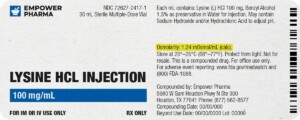Co-enzyme Q10, Ubiquinone (CoQ10) is a fat-soluble, vitamin-like compound that acts as a carrier for electron-transfer within the inner mitochondrial membrane. It also plays a vital role in ATP production (oxidative phosphorylation). Antioxidant properties, such as free radical scavenging, have also been noted. CoQ10 may possess mild inotropic activity and may also influence prostaglandin metabolism, specifically prostacyclin. The highest endogenous concentrations of CoQ10 are found in the heart, liver, kidney, and pancreas. CoQ10 levels are thought to be low in several diseases including CHF, hypertension, periodontal disease, certain muscular diseases, Parkinson’s disease, migraine headaches, and AIDS.[2]
Antioxidant actions: The role of CoQ10 in the treatment of mitochondrial disorders and CHF is thought to involve its antioxidant properties. In patients with disorders of mitochondrial function, serum lactate and lactate/pyruvate ratio are increased due to impaired oxidative metabolism. These levels are reduced with supplementation of CoQ10 resulting in improved exercise tolerance and function. In CHF patients, levels of CoQ10 are often low. The mechanism of CoQ10 in the treatment of CHF may involve supplementation of these levels as well as prevention of oxidative damage. In CHF, the greatest benefit of CoQ10 appears to be in patients with the largest CoQ10 deficiency.[2]
ATP generation/oxidative phosphorylation: CoQ10 may aid the production of ATP by preventing the depletion of metabolites necessary for ATP resynthesis. Increased production of ATP may produce antianginal effects. Additionally, in patients with migraine headaches, CoQ10 may improve mitochondrial oxidative phosphorylation, which may be impaired in some patients.[2]
Membrane stabilization: CoQ10 appears to possess direct membrane stabilizing properties due to phospholipid-protein interactions. The antioxidant and membrane stabilizing properties of CoQ10 may contribute to its ability to protect myocardial tissue during ischemic reperfusion.[2]



 DHEA / Pregnenolone Capsules
DHEA / Pregnenolone Capsules Niacin IR Tablets
Niacin IR Tablets Vitamin B-Complex Injection
Vitamin B-Complex Injection Methylene Blue Capsules
Methylene Blue Capsules Omega 3 Fish Oil Capsules
Omega 3 Fish Oil Capsules Resveratrol Capsules
Resveratrol Capsules DHEA Troches
DHEA Troches Naltrexone HCl Capsules
Naltrexone HCl Capsules Ezetimibe Tablets
Ezetimibe Tablets Cyanocobalamin Tablets
Cyanocobalamin Tablets